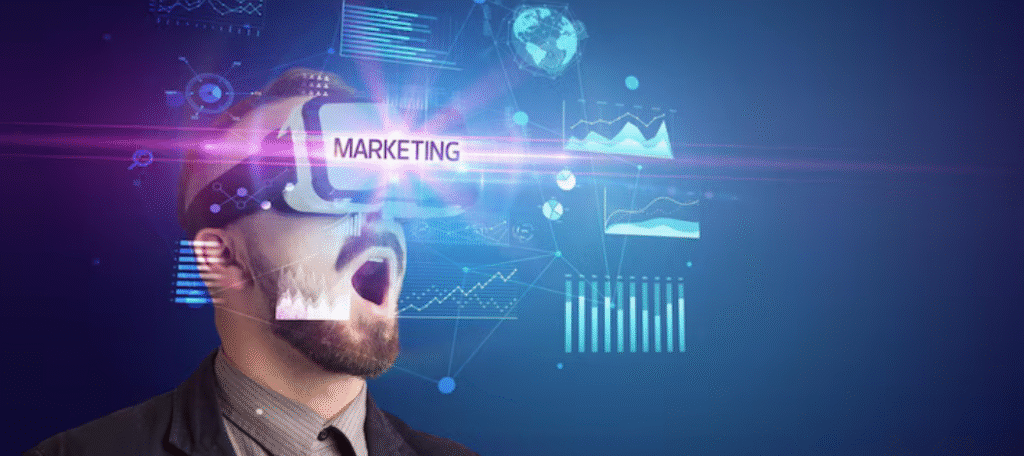The integration of artificial intelligence (AI) into digital marketing is no longer a futuristic idea—it’s happening now. As AI continues to evolve, digital marketing agencies must adapt to stay competitive and relevant. From automating repetitive tasks to hyper-personalizing user experiences, AI is reshaping how brands connect with their audiences. This blog dives into the current state, future possibilities, and actionable insights that every agency should know to thrive in this AI-driven era.
1. Understanding AI in Digital Marketing
AI refers to the simulation of human intelligence in machines that are programmed to think, learn, and make decisions. In digital marketing, AI encompasses a wide range of tools and technologies, including
- Machine Learning (ML): Algorithms that improve automatically through experience.
- Natural Language Processing (NLP): Enables machines to understand human language.
- Predictive Analytics: Uses data to forecast future behaviors.
- Computer Vision: Allows machines to interpret visual content.
- Chatbots and Virtual Assistants: Automate real-time communication with users.
2. The Current Role of AI in Digital Marketing
AI is already powering many of the tools and platforms that marketers use daily:
a. Content Creation and Curation
AI tools like ChatGPT, Jasper, and Copy.ai help marketers draft blog posts, captions, and product descriptions. These tools save time and provide inspiration but still require human oversight to ensure authenticity and brand voice.
b. Programmatic Advertising
AI algorithms analyze real-time data to automate the buying and placement of ads. This improves targeting, reduces costs, and increases ROI.
c. Chatbots and Customer Support
AI-powered chatbots offer 24/7 customer service, handle queries, and even process sales. Tools like Drift, Intercom, and ManyChat enhance user engagement and satisfaction.
d. Email Marketing Automation
AI helps optimize send times, subject lines, and content based on user behavior, leading to higher open and conversion rates.
e. Predictive Analytics
AI can analyze vast datasets to predict user behavior, such as the likelihood of conversion, churn, or purchase, enabling proactive strategies.

3. Future Trends: How AI Will Transform Digital Marketing
As AI technology advances, its impact on digital marketing will deepen. Here are key trends to watch:
a. Hyper-Personalization
AI will enable marketers to create highly tailored experiences for individual users based on real-time behavior, preferences, and past interactions. This goes beyond segmentation into true one-to-one marketing.
b. Voice and Visual Search Optimization
With the rise of smart assistants and visual search tools, optimizing for voice and image queries will become essential. AI will help decode user intent and context more accurately.
c. Predictive and Prescriptive Analytics
Beyond forecasting behavior, AI will recommend specific actions marketers should take. This prescriptive approach will streamline decision-making and enhance strategy.
d. AI-Generated Video Content
Tools like Synthesia and Pictory are already allowing marketers to create AI-generated video content at scale. Expect even more advanced tools for storytelling and brand messaging.
e. Ethical AI and Data Privacy
As AI becomes more embedded, ethical considerations and data privacy will take center stage. Agencies must ensure transparent AI usage and comply with regulations like GDPR and CCPA.
4. Opportunities for Digital Marketing Agencies
Agencies that embrace AI can unlock significant advantages:
- Efficiency Gains: Automate repetitive tasks like reporting, keyword research, and A/B testing.
- Enhanced Creativity: Use AI tools to brainstorm content ideas, designs, and strategies.
- Better Client Insights: Leverage AI analytics to provide more value and improve client retention.
- Competitive Edge: Offer innovative services like AI-powered SEO, chatbots, and dynamic personalization.
5. Challenges to Consider
Despite its benefits, AI implementation comes with challenges:
- Learning Curve: Agencies need to invest in training to understand and leverage AI tools effectively.
- Over-Reliance: Blindly depending on AI can dilute creativity and lead to generic content.
- Data Dependency: AI performance depends on the quality of data. Inaccurate or biased data can mislead strategies.
- Cost and Integration: Advanced AI tools can be costly and may require technical integration support.
6. Action Plan: How Agencies Can Prepare for the AI Future
a. Upskill Your Team
Invest in training your team on AI tools, data interpretation, and ethical usage. Encourage certifications and hands-on experience.
b. Experiment Strategically
Start small by integrating AI in specific tasks like email optimization or chatbot implementation. Measure results and scale gradually.
c. Stay Updated
AI is evolving rapidly. Follow leading blogs, attend webinars, and engage in communities like AI in Marketing forums and LinkedIn groups.
d. Focus on Human-AI Collaboration
Use AI to enhance your team’s capabilities, not replace them. Human creativity, empathy, and intuition still play critical roles.
e. Prioritize Ethics
Create internal guidelines for ethical AI usage. Ensure transparency with clients about how AI is used in campaigns and data handling.

Conclusion
AI is not just a tool but a transformative force in digital marketing. Agencies that adapt, innovate, and stay ahead of the curve will thrive in this new landscape. By understanding AI’s capabilities and limitations, digital marketing professionals can harness its power to drive meaningful results, foster client relationships, and future-proof their businesses.
Are you ready to embrace the future of AI in digital marketing? The time to act is now.

